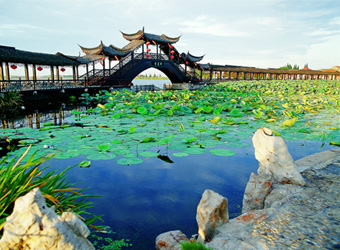The ancient water town of Jinxi lies in the southwest of Kunshan, Jiangsu province. With a total area of 90.69 sq km, it has a permanent population of 84,000, of which 44,000 are officially registered as local residents. The town has 3 communities and 20 administrative villages under its jurisdiction. In Jinxi, there is flowing a river lined with many peach trees on its banks. Under the rising and setting sun, the glittering river looks like a colorful landscape painting. This is how Jinxi, which literally means "colorful river" came to be used as the name of the town.
Jinxi has an abundance of natural resources and cultural heritages. As part of Suzhou, which is acclaimed as a "heavenly city" together with Hangzhou, Jinxi features a typical waterscape of the region—a place known as a "land of fish and rice" since ancient times. With nearly half of its area covered by water, the town is crisscrossed by 226 rivers. Of 19 water bodies whose area is above 47 hectares and that are directly managed by the provincial government, 10 are located in Jinxi. In its 0.51-sq km area reserved for the protection of cultural heritages, there are 6 ancient rivers, 12 old streets, 16 ancient bridges, as well as many residences that date back to both the Ming and Qing dynasties and the period when China was ruled by the KMT government. Totally, these residences have more than 4,000 rooms, with a total built area of 86,800 sqm.
With more than 2,500 years of history behind it, Jinxi boasts a well-preserved history and culture and has won many national titles and honors, including China Cultural and Historic Town, China Folk Culture and Art Capital, National Model Town in Environmental Beauty, National Healthy Town, China Model Habitat, National Special Town-level Tourist Destination, China's Most Beautiful Town, China Top 10 Villages and Towns for Leisure-oriented Tourists and National AAAA Scenic Spot. It has also been placed on China's candidate list of World Cultural Heritage. In addition to Xuanjuan, an ancient ballad form that has been listed as a national intangible heritage, Jinxi also hosts 14 cultural sites, including the ancient kiln sites in Zhudian and the former premises of the sub-county administrative office, which are listed as the provincial-level cultural sites, as well as the water tomb of Concubine Chen, Tongshen Nunnery, and Wenchang Pavilion, which are named as the municipal-level cultural sites.
The period of China's 12th Five-Year Plan witnessed a fast socio-economic progress. On the economic front, its GDP expanded from RMB 3.9 billion in 2010 to 6.37 billion in 2015; industrial output, from RMB 9.82 billion to 16.23 billion; fiscal income, from RMB 220 million to 540 million. Among 58 companies whose annual turnover has exceeded designated levels, 20 have reported an annual turnover of RMB 100 million; and 3, over RMB 1 billion. Jinxi has been selected by the provincial government as a pilot in innovation-driven development and its ecological industrial park has been listed by Jiangsu as an experimental zone for IT-driven industrialization. On the social front, a number of public service facilities have been completed and operational, including Jinxi Primary School, the Culture and Sports Center, Jinxi Hospital, Huanhu Kindergarten and three Senior Daycare Centers in the village of Qiuze. On the cultural front, in addition to the techniques of making Wadi Su (a crispy cake), traditional costume and wood boat, its ancient brick and tile making technique has also been listed as a provincial intangible cultural heritage, turning Jinxi into the largest owner of intangible heritages among its peers in Kunshan. Moreover, Jinxi was recognized by the WHO Alliance of Healthy Cities for its health promotion efforts. Besides, it was also granted by the Ministry of Environmental Protection the "China Bao Steel Excellent Environmental Award", and its Mingjingdang Water Conservancy Park has become the first scenic spot based on a national water conservancy project.
During the 13th Five-Year Plan period, Jinxi will closely follow the "Four Comprehensives" strategy and implement the five development concepts of "innovative, coordinated, green, open and sharing" to transform Jinxi into a place that boasts a strong economy, balanced rural-urban development, a pleasant ecological environment, a unique cultural identity and high living standards.
Tel: +86 512 5723 1039
P.C.: 215324


